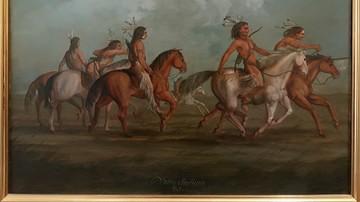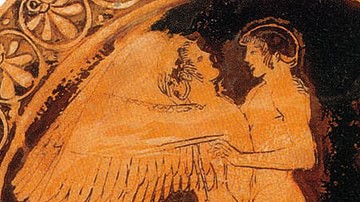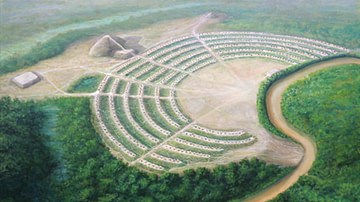Search
Did you mean: Vishnu?
Search Results

Definition
Hausaland
Hausaland, sometimes referred to as the Hausa Kingdoms, was a group of small independent city-states in northern central Africa between the Niger River and Lake Chad which flourished from the 15th to 18th century CE. The origins of the Hausa...

Definition
Uluburun Shipwreck
The Uluburun shipwreck is a Bronze Age vessel discovered lying off the coast of Kas, Turkey. The ship, probably originally from Phoenicia/Canaan, dates to between 1330 and 1300 BCE and was carrying a full cargo of trade goods, perhaps from...

Definition
Plains Indians
The Plains Indians (also known as Native Americans of the Plains and Prairie, Indigenous Peoples of the Great Plains) are the original inhabitants of the western plains of North America, now part of the United States and Canada. They are...

Definition
Ur-Nammu
Ur-Nammu (r. 2047-2030 BCE) was the founder of the Third Dynasty of Ur in Sumer who initiated the so-called Ur III Period (2047-1750 BCE) also known as the Sumerian Renaissance. He is best known as the king who composed the oldest extant...

Definition
Zephyrus
Zephyrus was the god of the west wind and the messenger of spring in Greek mythology. He was known as one of the four Anemoi, or wind gods, each of whom represented a cardinal direction and, except for Eurus, a season. Zephyrus was often...

Definition
Poverty Point
Poverty Point is an archaeological and historic site in Louisiana, USA, dated to c. 1700-1100 BCE, enclosing one of the most significant Native American mound sites from Pre-Colonial America. It was once the location of a grand complex of...

Definition
Ryujin
Ryujin (aka Ryu-o) is the dragon king, sea god, and master of serpents in Japanese mythology. With his magic jewels he is responsible for the tides, and he represents both the perils and bounty of the sea and so was especially relevant to...

Definition
Hallstatt Culture
The Hallstatt culture is named after the site of that name in Austria and it flourished in central Europe from the 8th to 6th century BCE. The full period of its presence extends from c. 1200 to c. 450 BCE - from the Late Bronze Age to the...

Definition
Byzantium
The ancient city of Byzantium was founded by Greek colonists from Megara around 657 BCE. According to the historian Tacitus, it was built on the European side of the Strait of Bosporus on the order of the “god of Delphi” who said to build...

Definition
Joseph Haydn
Joseph Haydn (1732-1809) was an Austrian composer of Classical music who is widely regarded as one of the greatest composers in history. Haydn spent most of his career around Vienna, where he pioneered the symphony and string quartet format...